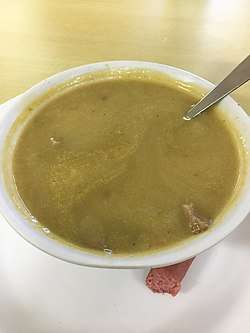Mtori
Mtori is a popular Tanzanian stew made of bananas and meat, but it contain other ingredients (e.g. potatoes, milk or cream).
 | |
| Type | Stew |
|---|---|
| Place of origin | Tanzania |
| Main ingredients | bananas, meat |
The soup originated in the Kilimanjaro area of Tanzania, specifically the Moshi-Arusha region.[1][2] Plantains/green bananas are often eaten in this region as the main source of starch.[1] It has since spread to other areas throughout Tanzania.[3] A special stick is traditionally used to mash the bananas.[2] Mtori is often eaten by Maasai women during a three-month period postpartum confinement for nutrition.[4] During this postpartum period, women are given mainly soft foods (laini) to eat like mtori.[5]
Because it is a thick stew, it can be served as a main course.[6] It can be eaten during breakfast, lunch, or dinner.[1]
See also
References
- Kitu Kizuri (in German). Kitu Kizuri LLC. 2008. p. 60. Retrieved 2019-07-19.
- Riyamy, A.S. (2001). African Gardens: The Cuisine of Zanzibar and the East African Coast. Riyamy Publications. Retrieved 2019-07-19.
- Gall, T.L.; Hobby, J. (2009). Worldmark Encyclopedia of Cultures and Daily Life: Africa. Gale virtual reference library. Gale. ISBN 978-1-4144-4883-1. Retrieved 2019-07-19.
- Horn, C. (2013). Maasai Cooking (in Estonian). Books on Demand. p. 14. ISBN 978-3-7322-8040-7. Retrieved 2019-07-09.
- Armstrong, K.; Suomen Antropologinen Seura (1999). Shifting ground and cultured bodies: postcolonial gender relations in Africa and India. University Press of America. p. 28. ISBN 978-0-7618-1389-7. Retrieved 2019-07-19.
- Webb, L.S. (2000). Multicultural Cookbook of Life-Cycle Celebrations. Cookbooks for Students Series. Oryx Press. p. 7. ISBN 978-1-57356-290-4. Retrieved 2019-07-09.